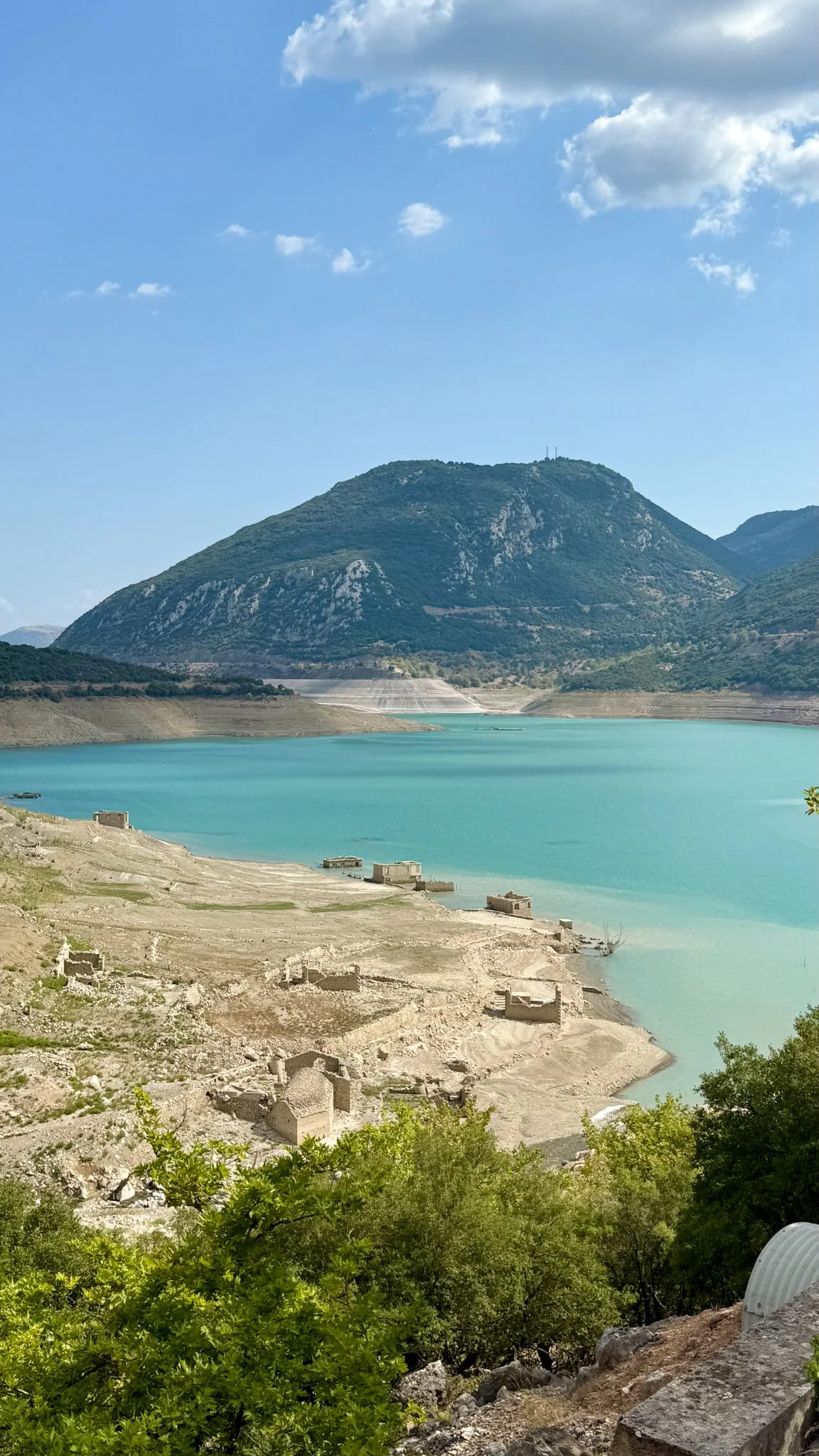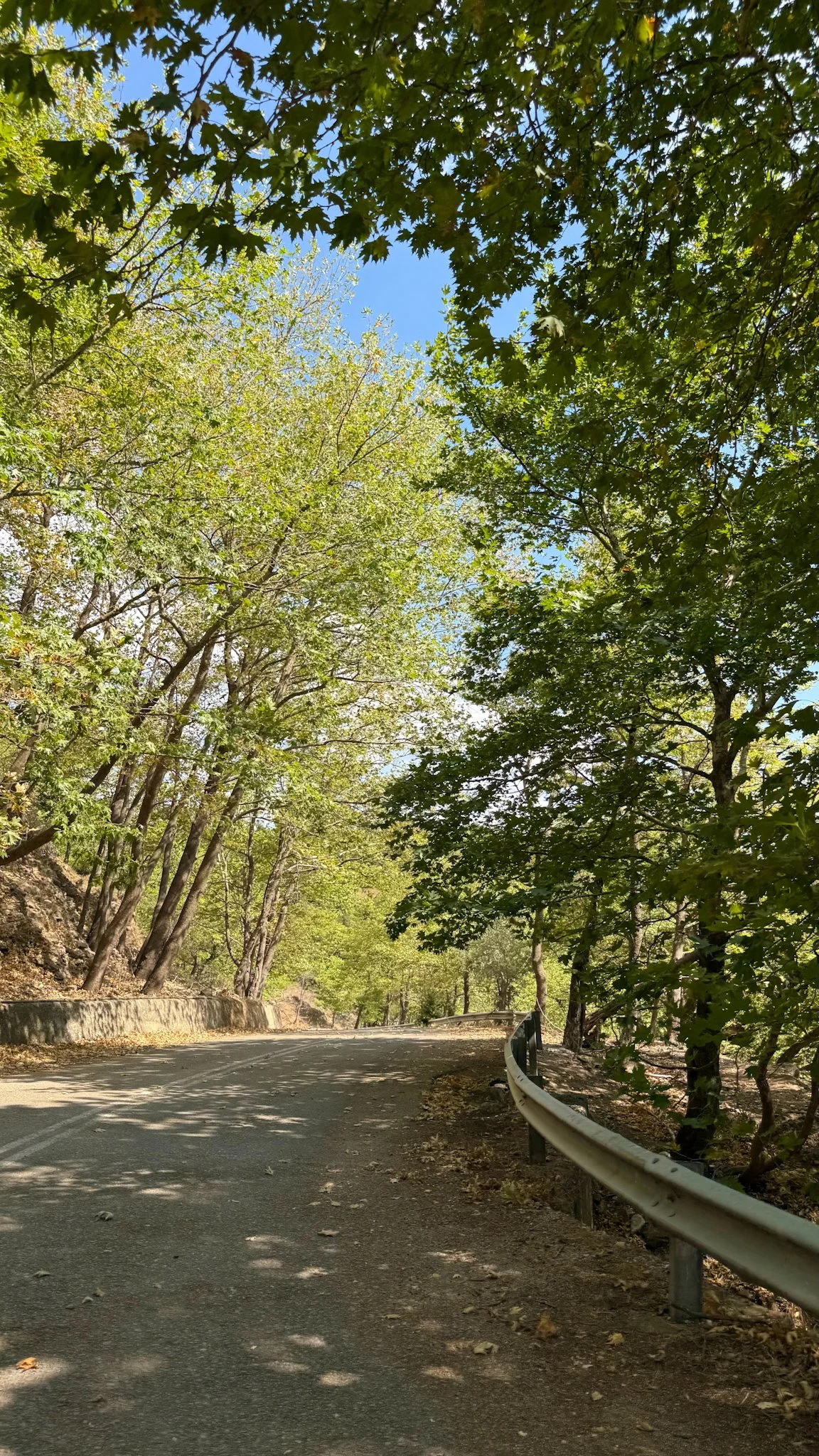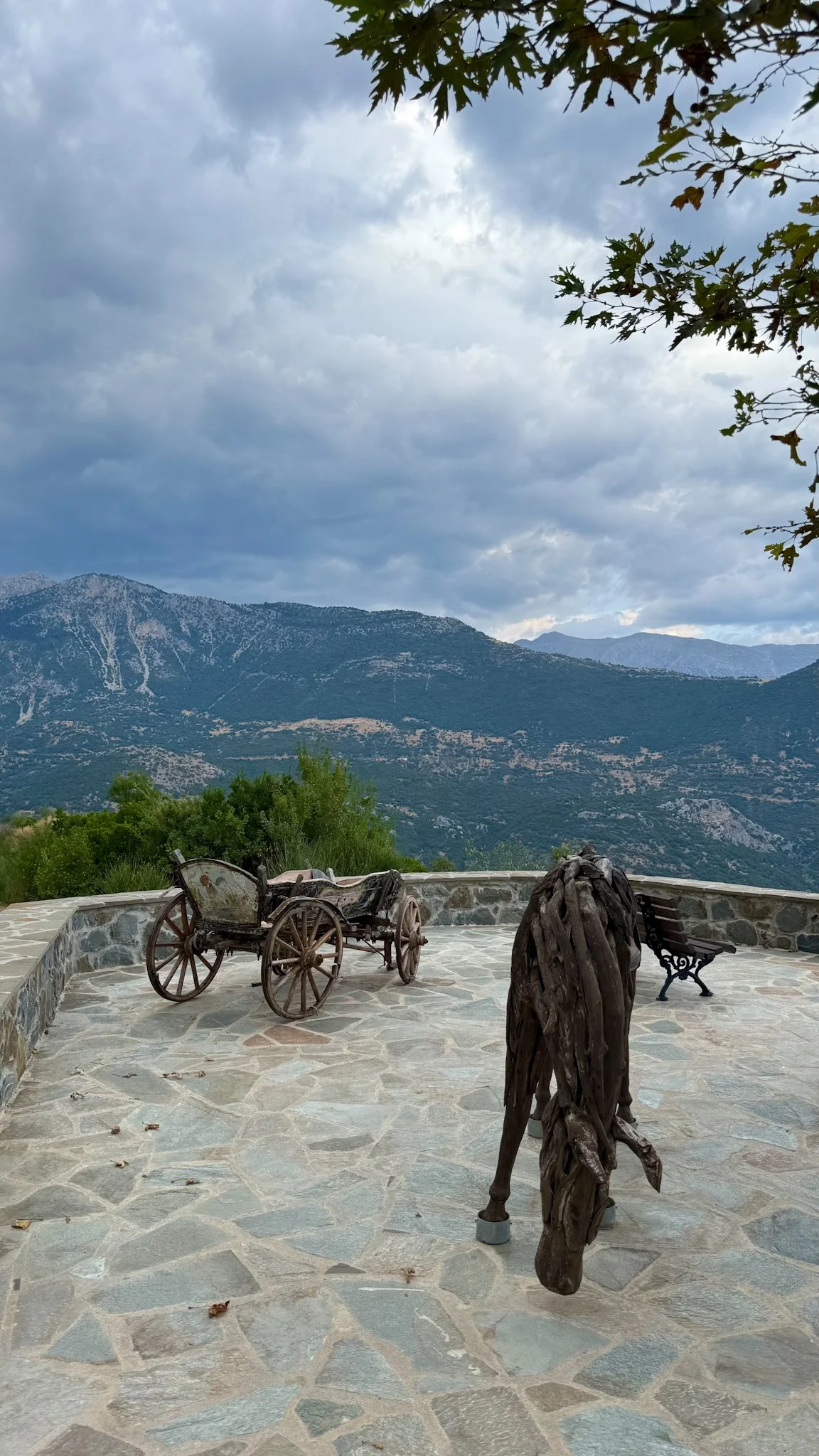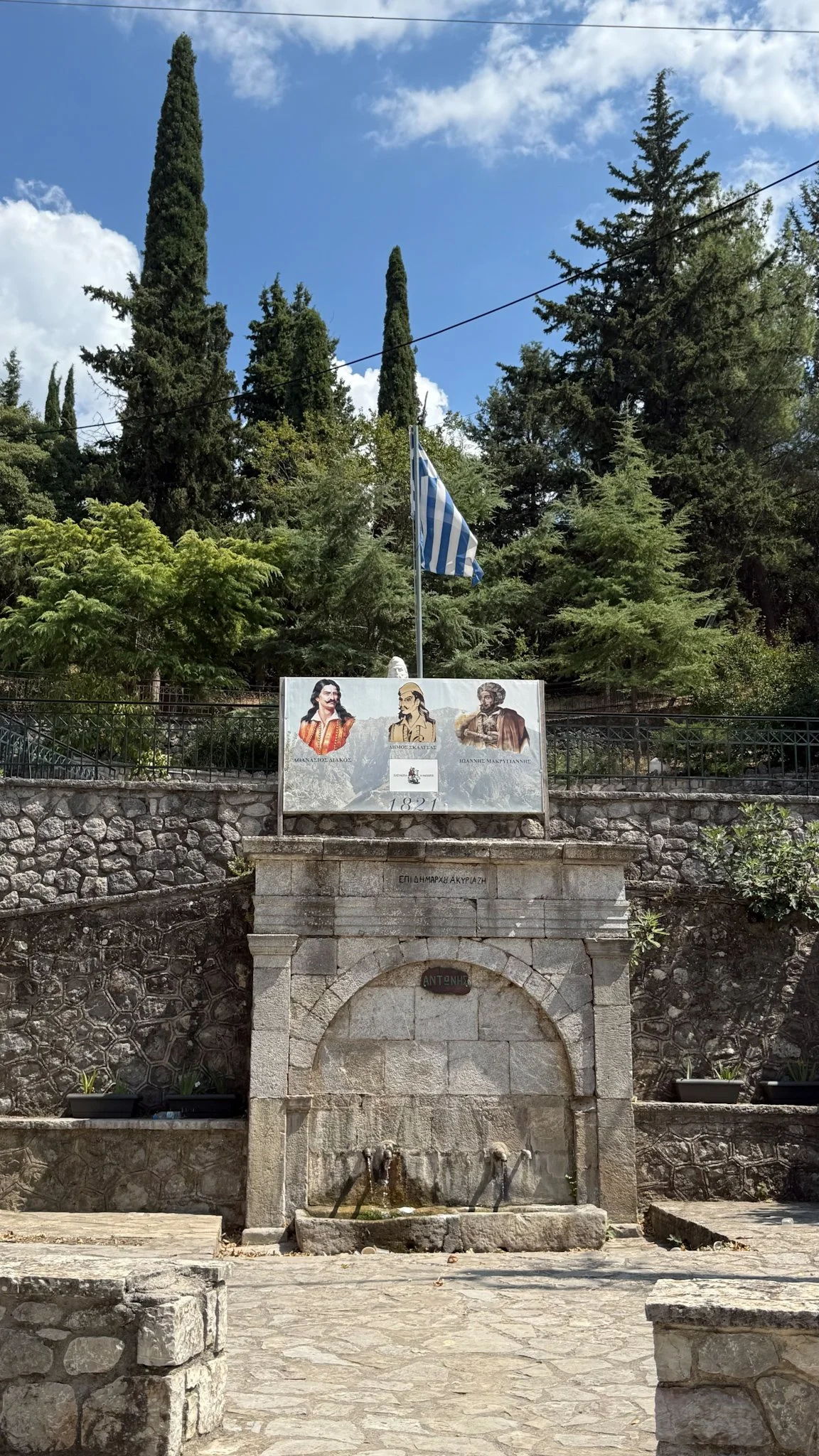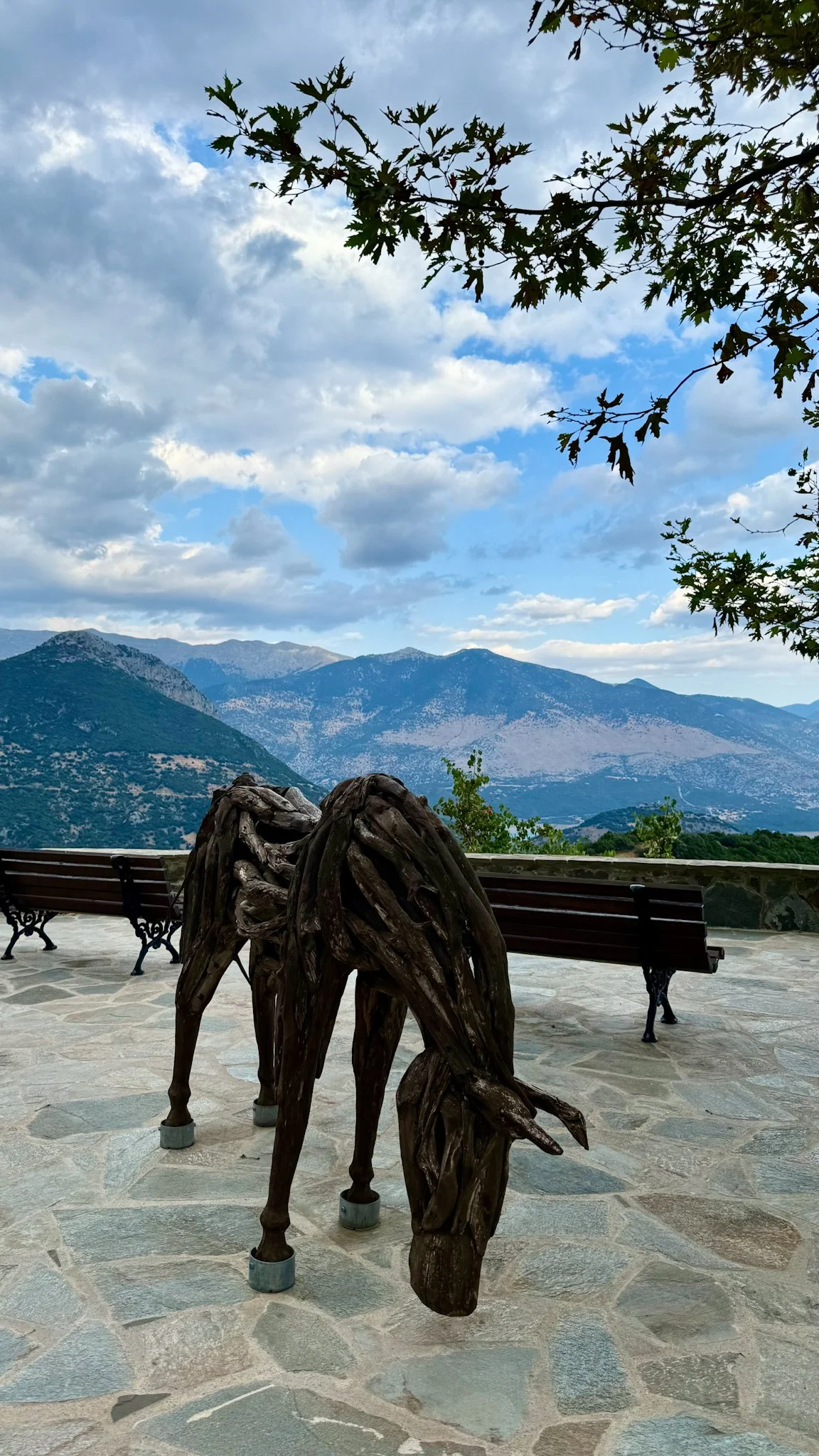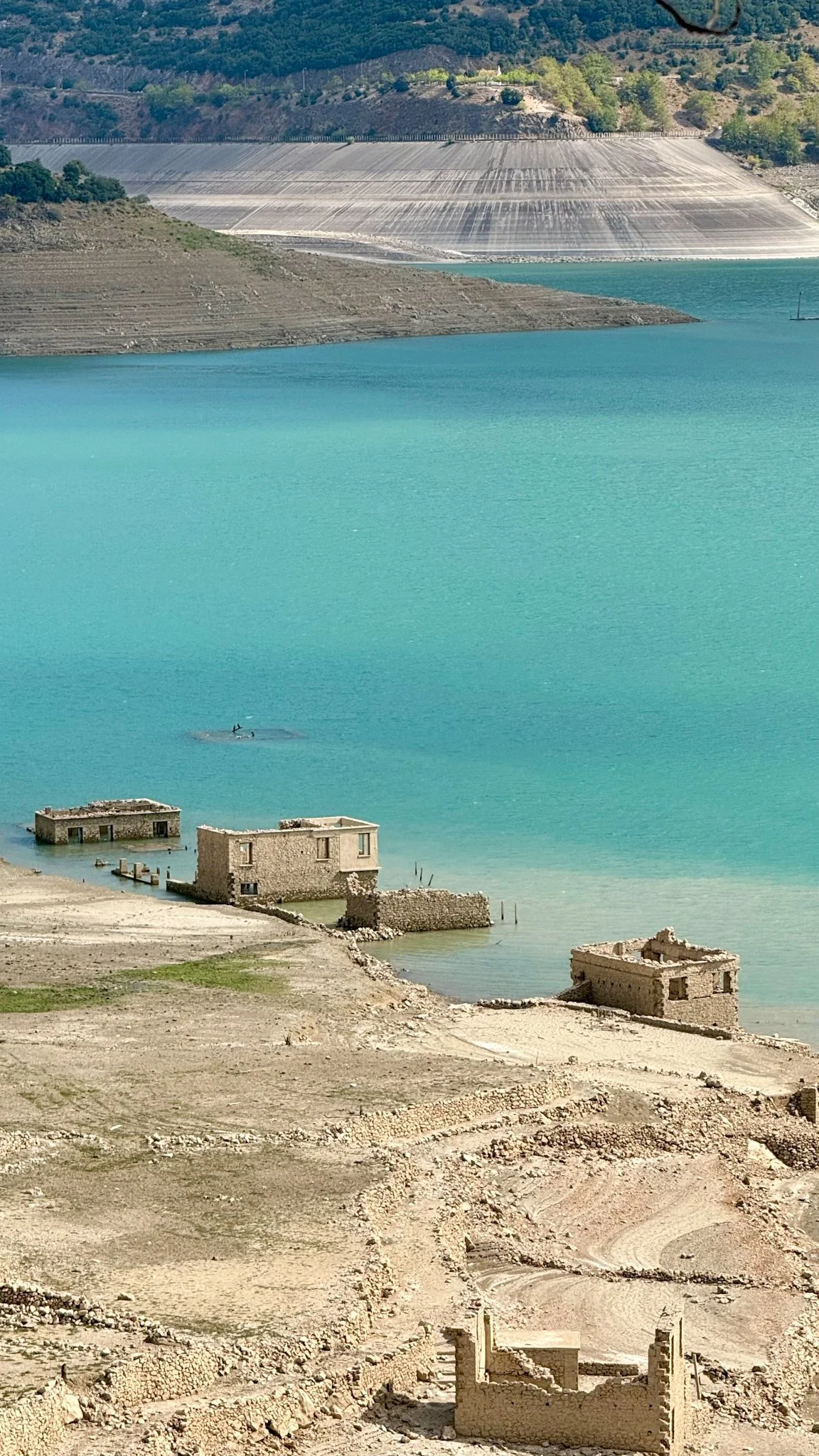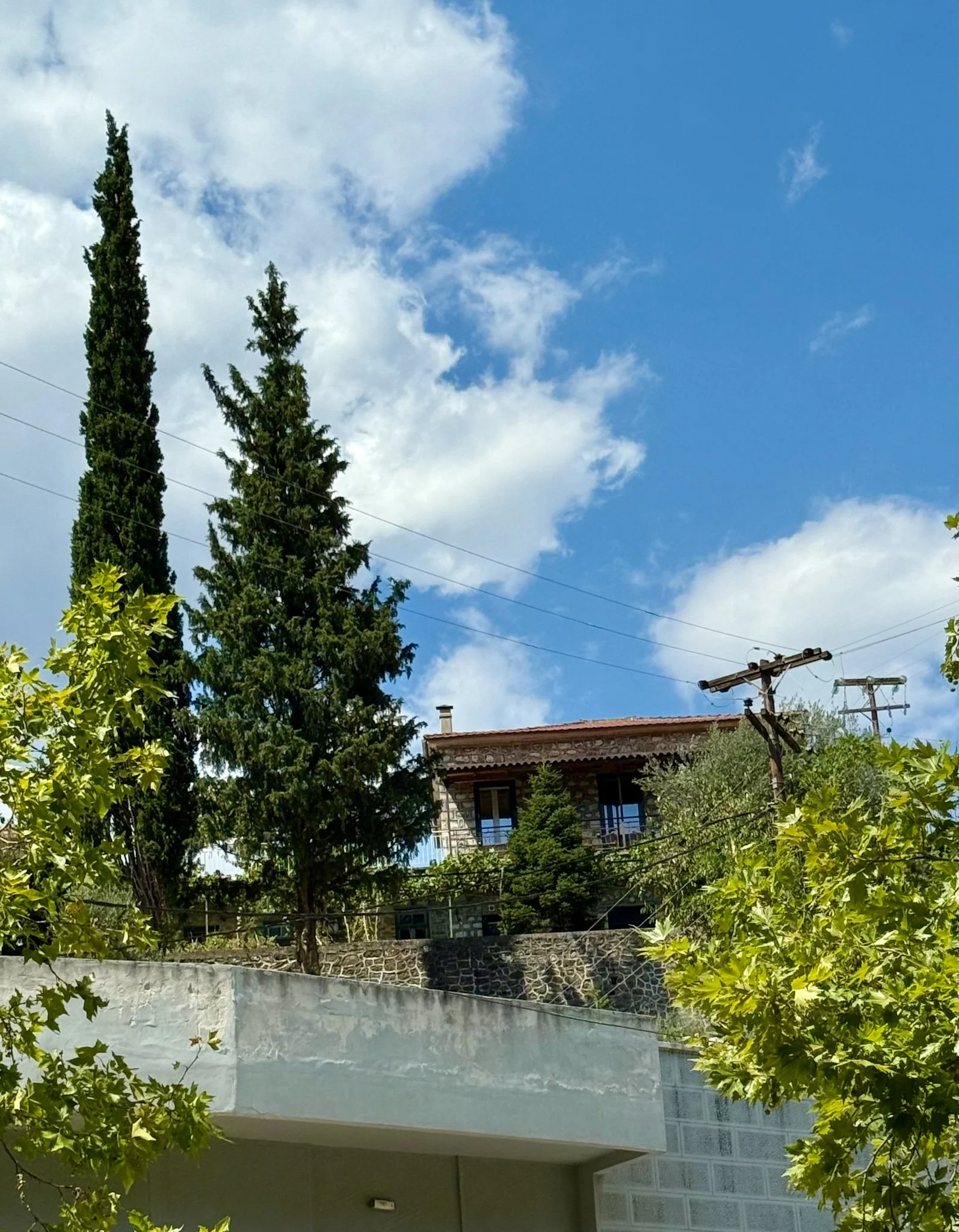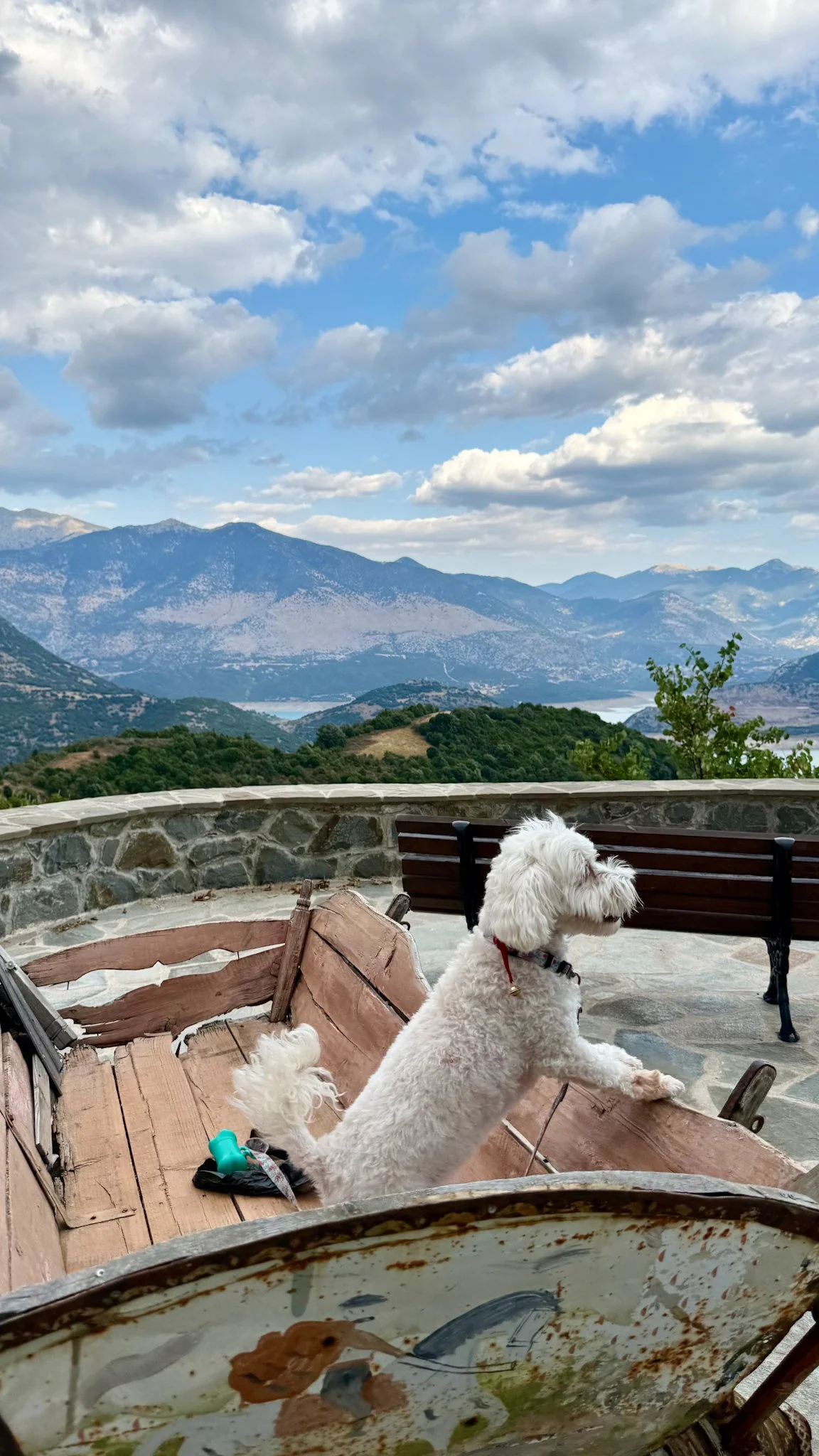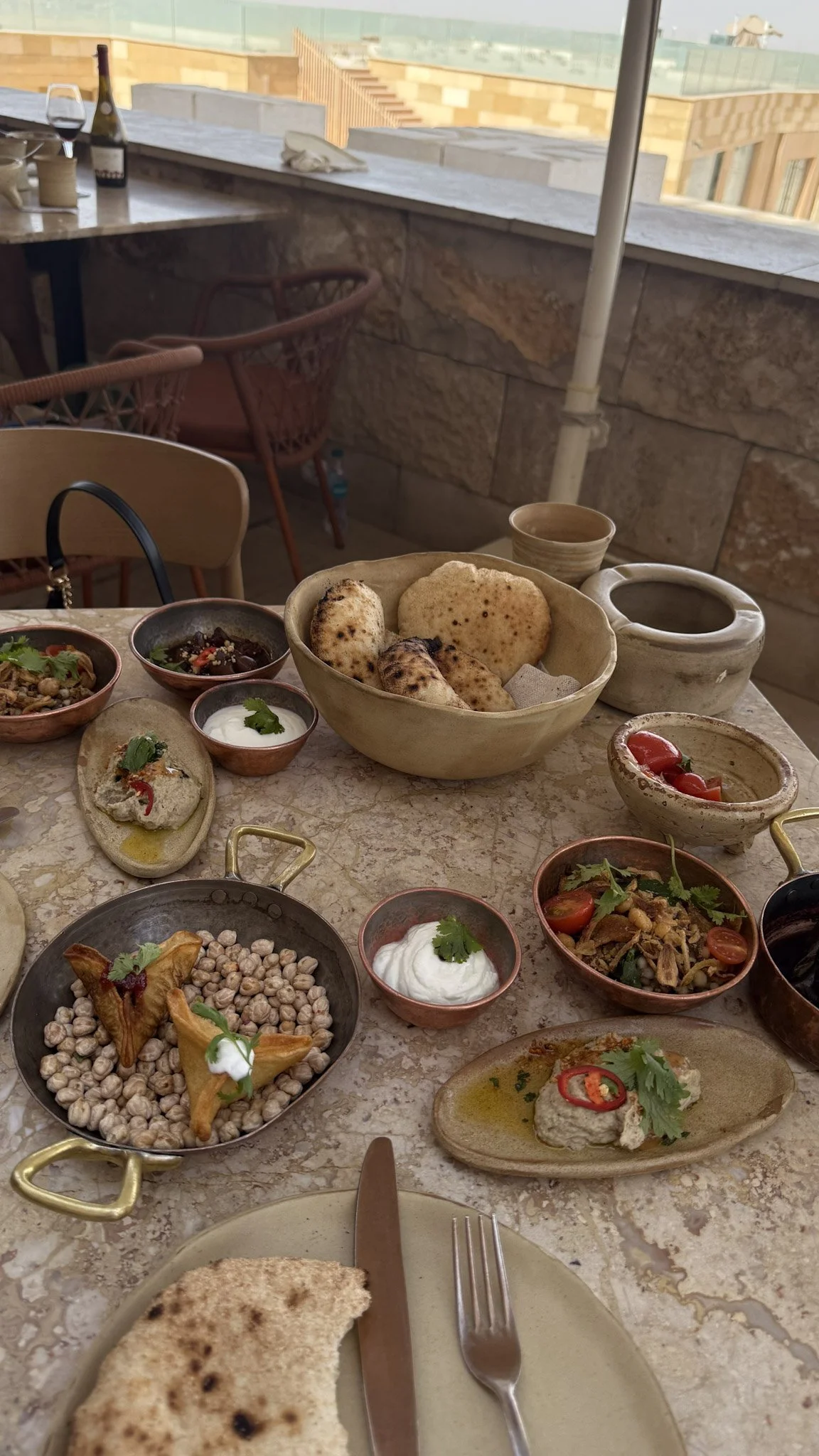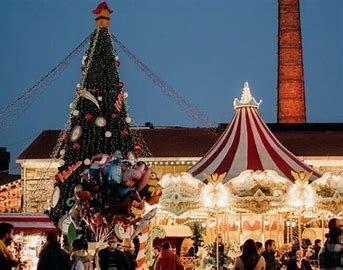The Village That Became a Lake: Tracing Family Ancestry Underwater at Kallio
Visiting the submerged village of Kallio in Fokida and reconnecting with family roots
There is something so special about visiting the home of your ancestors. Everything feels… different. The energy shifts. A part of you that may have felt detached suddenly awakens, especially when it comes to a town that was turned into a lake.
We go to Fokida every year. This is the family's long-awaited holiday. With my mother's roots in the region, we grew up spending time there. Marathias, Nafpaktos, Monastiraki, Efpalio, Eratini, the area of Fokida and Aitoloakarnania, all hold real, authentic, deeply connected Greek beauty. Traveling all over the world and living in the fast-paced, often hostile city life, it is a relief to come here, to feel allowed to relax, to turn your brain off, and enjoy doing nothing.
With that being said, reconnecting with this way of living, it all made sense to visit Kallio, the former village that was submerged to create Lake Mornos, which supplies water to Athens. The village was flooded in the late 1970s, around 45 years ago. This year, due to the severe drought of 2024, the lake's water levels had dropped significantly, revealing remnants of the village. Seeing the home of my great-grandparents, grandparents, and the house my mother and aunt had grown up in was nostalgic and moving. My brother and I had heard so many stories, but seeing it in person brought it all to life.
Our drive was about two hours from Eratini village. As we drove north up the mountains, the ocean views gave way to lush greenery and the grandeur of the mountains. We first stopped at the village of Lidoriki, where my mother and aunt had lived as children. It was exciting to experience such a change of scenery from the usual sea views. From Lidoriki, as we drove, glimpses of the lake began to appear. The turquoise waters contrasted with exposed sandy areas caused by the drought, showing how low the water had fallen. The more we drove around the lake and through the mountains, the clearer the remnants of the village became. It felt like discovering a long-lost ancient place, but it was only from 45 years ago.
As we continued driving, we stopped at a small church and cemetery overlooking the submerged villas where our great-grandparents were buried. The tiny church had keys hanging right on the door for wanderers like us, allowing us to step inside, light a candle, and then visit the cemetery. A silver door near the lake was locked, but I managed to find a way around it to get closer to the submerged homes. Though there was a faint sadness seeing the village that once was, the sight was stunning and familiar.
Having been disconnected from my culture and family while living abroad, it was refreshing to reconnect with the roots of my ancestors. Driving along the lake, through green mountains, tiny villages, and beautiful trees, we even had to stop for a shepherd and his goats to cross the road. Sonder was really felt at that point, realizing how different these people’s lives are compared to our own. We finished the scenic drive descending the mountain toward Monastiraki, where we enjoyed a sunset dinner and swim.
A strong sense of pride surged through me that evening. Pride in how deep our roots run, in feeling connected to a family we never met, knowing parts of them live within us. My brother and I heard stories of our grandparents and great-grandparents, told of their kindness and love. They lived lives full of love without much material wealth, proving that materialism is not a sign of a good life. What matters is how life is lived, keeping good people close regardless of circumstances. The courage and pride that flows through this bloodline is profound, and it is up to us to continue living by these values in modern life.
Nothing is quite significant, yet it feels important. This is something all modern people seem to be chasing. Something all modern gurus are trying to teach Westerners: the art of doing nothing, of allowing our nervous system to catch a break. People take courses and retreats on this, acting as if it is strange, because how can you truly feel happy and satisfied when being unproductive? Where is the value in just existing and enjoying life, instead of constantly being in a must-do mode? For Greeks, this is a way of living, and this is why travelers keep coming back, even though there are so many beautiful countries in the world, to experience this way of life again.
Of course, like everything, it has both pros and cons. Too much of this lifestyle can negatively affect other areas of life. As the ancient Greeks said, “παν μέτρον άριστον” — balance is everything. Everyone could take a lesson from this. Imagine how much happier people could be. Illnesses, mental stress, and chronic anxiety would decrease if people incorporated this into their daily life. The art of being present, thriving, enjoying, and slowing down. Being present with your loved ones, with the environment around you, and appreciating all of God’s creation. For me, this is living through the aesthete lens.
After a mentally challenging year and many life changes, it was difficult to stay in that way of living. However, returning to our second home in Fokida was the perfect twist. Not just a reminder, but living it again and ingraining it back into my subconscious, my body, and my daily life.
From this experience, anyone can learn the value of slowing down, being present, and cherishing the people and surroundings around them. The Greek way of living teaches us that happiness does not come from constant productivity or material wealth, but from connection, balance, and appreciation for the everyday moments of life.
Cairo Travel Diary: Pyramids, People, and Unexpected Peace
Uncover the wonders of Egypt, from the ancient pyramids to the bustling heart of Cairo, and immerse in its rich culture, the aesthete way
Going to Egypt had been a dream of mine, one I had been visualizing for years, even in my sleep. After listening to Graham Hancock speak about ancient civilizations on Joe Rogan’s podcast and watching the Ancient Apocalypse series, I couldn’t shake the urge to go. Egypt felt more than just a place, it felt like a calling. As a Greek woman, I sensed a strange and powerful connection. Our ancient histories intertwine, and I wanted to experience it for myself.
Now that I live in Athens, it’s only a short flight to Egypt. When the right travel partner came along, I knew it was finally the right time to make the trip.
Day 1
I always book the window seat when I fly, especially when I’m going somewhere I’ve been dreaming about. As we were about to land, the sun was rising and I got my first glimpse of the pyramids from the air, I nearly screamed.
Ironically, for someone who plans travel professionally, I arrived in Egypt with no plan, no transportation arranged, and no cell service. There was no Wi-Fi at the airport, and my Greek phone wasn’t working. I had about 10% battery, and no one spoke proper English. Still, I managed to reach my travel partner and get picked up from the airport.
We were staying in downtown Cairo in a local apartment. From the outside, it looked kind of scary, but once we got in, it was beautiful and cozy. It had everything we needed.
Later, we had lunch at Khufu’s restaurant right next to the pyramids, and we couldn’t wait for our tour the next day. So, we walked down to the sand and saw them up close, which felt so surreal. Eventually, we were asked to leave by security. We went back at night and had drinks at Pier 88, a popular bar by the Nile, where we met people who had even visited the Greek area of Glyfada. Small world.
Day 2
We got picked up at 7 AM by our amazing guide, who arranged everything for us, entrance, tickets, navigating security, and sharing stories throughout the day. We saw the pyramids and the Sphinx. It was unreal. The energy was powerful and grounding. As a Greek, I felt deeply connected. It felt like I was walking through a version of my own history.
We also climbed inside the pyramid, which is not for the faint of heart. It’s steep, hot, humid, and very narrow. There are people going up and down at the same time with no airflow. I’m 6'3", so I had to crouch the whole way, but I made it to the top. It was an intense and unforgettable experience.
Later, we rode camels through the Sahara Desert with panoramic views of the pyramids and even Saqqara in the distance. I had never seen camels in real life before. They felt mythical, like creatures from another time.
We ended the day visiting a papyrus workshop, where I got my name written in hieroglyphics, and we had falafel and shawarma from a local spot.
That night, we explored the local market in Cairo and ended up in a small local bar with shisha, sitting in peace and reflecting on the day.
Day 3
As a Greek Orthodox Christian, visiting the St. George Church in Coptic Cairo was powerful and emotional. No matter where I go, seeing the Greek flag and hearing the Greek language brings me pride.
After that, we visited the new Grand Egyptian Museum, a must-see. It was massive, beautifully built, and offered an incredible view of the pyramids. The collection included sarcophagi, royal jewelry, and ancient artifacts, all displayed with great care and detail. It was stunning, truly impressive. Yet, as we walked through the halls, one question stayed with us: with all the funding that went into preserving the past so grandly, should some of it have been used to support the city’s present, or its future? Could part of that investment have gone toward improving infrastructure or uplifting communities instead? It was a quiet thought that lingered beneath the awe.
Later, we visited a mosque for the first time, Al-Azhar Al-Sharif. We wore the appropriate clothing provided and entered into a different world. It was quiet, peaceful, and spiritual. We sat there for over an hour, reflecting on how much our environment influences our beliefs, perspectives, and values.
We ended the day with a private felucca ride on the Nile during sunset and then headed for dinner at Saheb El Saada, a restaurant near Khan El Khalili. The whole area was vibrant and festive, it felt like a celebration of life. There was live Arabic music echoing through the alleyways, a DJ blending sounds, people in costume, laughter, movement, energy. It was loud, colorful, and full of character.
Day 4
On our last day, we visited the Cairo Citadel and explored Islamic Cairo with our guide, Robert. Once again, we found ourselves experiencing something unlike anything we had ever encountered before. Being in an underdeveloped, third-world country, there was a certain charm to it all. It was intriguing and eye-opening. We were so different, stepping into their world, their normal, as if we had walked into another century.
The local markets in Khan El Khalili had the same effect. Instead of seeing the handmade ceramics we know in Greece, we saw stones with hieroglyphics. Luckily, Robert was there to help guide us through the market, especially when it came to pricing—nothing was on display. Bargaining is an art form, and I’m terrible at it, so I’m grateful that Robert and my friend took over for me. It’s all part of the experience, and I loved learning about it.
We finished the day with a peaceful lunch by the Nile before heading to the airport. Over lunch, we had incredible discussions with our guide—talking about religion, the way he’s raising his children, life in Egypt, and how difficult it is for him to get a visa for the USA or Greece. As a group made up of people from Greece, Brazil, and Egypt, we had different ideologies, life views, and backgrounds, but there was a mutual respect for each other’s perspectives. We created bonds that will last, all fueled by genuine curiosity and a willingness to learn.
Reflecting on the trip, my biggest takeaway was how important it is to travel with a group that is equally open to learning and experiencing new cultures. Staying open-minded is essential, especially on a trip like this. The Greek Aesthete travel agency can help plan an ultra-luxury experience in Egypt, but sometimes the best way to experience a place the “aesthete” way is by doing it in the simplest way possible—diving deep, listening to locals, and embracing the experience fully.
Throughout the trip, I never felt unsafe as a woman—never once did I feel like I would be attacked or stolen from. I did feel a bit uncomfortable at times, but not in a way that felt threatening. Egypt was a once-in-a-lifetime experience—eye-opening and full of contrasts that reminded me of why I do what I do in the hospitality and travel industry.
Seeing and experiencing different cultures changes something in you each time. You get to choose what to keep, what to change, and what to adopt into your own beliefs. Most importantly, it teaches you to keep an open mind, to see the beauty in differences, and to embrace the unknown. These cultural shocks expand our horizons and help us learn more about others—and about ourselves. It also reminds us to connect with something bigger than ourselves.
Seeing people with much less than us, yet content and living life fully, is a powerful lesson. It’s a stark contrast to how we live, constantly hustling, comparing ourselves, and rarely sitting back to appreciate what’s in front of us.
If you plan to visit Egypt, make sure to dress modestly, hire a local guide, stay in a safe area (where The Greek Aesthete can help find the perfect accommodations), and bring your open mind. Prepare to experience a side of Egypt that goes beyond the tourist spots, and you'll leave with memories that will last a lifetime.
Final Thoughts
Traveling to Egypt was an unforgettable experience, one that truly transported me back in time while offering a kind of awakening I didn’t anticipate. Every moment was an exploration of contrasts, new, unfamiliar, yet deeply enriching. As a woman, I did not felt unsafe, though there were moments that pushed me out of my comfort zone. There’s a distinction between discomfort and danger, and Egypt taught me just that.
If you plan to visit, here are some tips based on my experience:
Dress modestly: This is key, not only for cultural respect but also for comfort.
Hire a local guide: A knowledgeable guide can enhance your experience, helping you navigate not only the historical sites but also the intricacies of local markets like Khan El Khalili.
Travel with an open mind: Going with a group who shares an interest in learning, connecting, and exploring new cultures makes all the difference.
Embrace discomfort: Sometimes stepping out of your comfort zone is where the magic happens. Don’t be afraid to experience a different pace of life.
Plan a mix of luxury and immersion: While luxury accommodations and services elevate the experience, the best memories often come from connecting with locals and immersing yourself in the culture.
As someone who specializes in luxury travel, I can plan a five-star experience for you, ensuring your comfort and luxury. But remember, some of the most transformative moments come from embracing the unfamiliar and learning from the environment around you. It’s these authentic experiences that truly define travel.
Travel like an aesthete. Embrace the beauty of the journey, and see the world not just for its opulence, but for its authenticity and cultural richness.
Why Winter in Greece is One of Its Best-Kept Secrets
Experience Greek hospitality in a way that goes beyond the typical summer escape
Now that it is officially spring, I cannot help but reflect on my first winter back in Greece after seven years. Having lived in the U.S., between Chicago and Los Angeles, my idea of winter had drastically changed. Chicago winters were brutal with freezing temperatures, endless snowfall, waking up early to scrape ice off the car windows, and bundling up in layers just to step outside. Meanwhile, LA winters were almost non-existent, with the occasional chilly morning but mostly mild, sunny days.
Returning to Greece in the winter was a completely different experience. Unlike the extreme cold of the Midwest or the continuous sunshine of California, winter in Greece had a crisp but mild feel. Days were cool but pleasant, making it easy to explore the city without feeling weighed down by heavy coats. But what many people do not realize is that Greece is not just a summer destination; its winter season has just as much to offer, from snow-covered mountains to vibrant city life and festive traditions.
Skiing in Greece: Yes, It’s a Thing
One of the biggest surprises for many visitors is that Greece has an active ski season. While people associate the country with beaches and islands, Greece is actually home to several ski resorts, offering everything from scenic alpine villages to après-ski culture. One of the most famous winter destinations is Arachova, a picturesque mountain town just under three hours from Athens, at the base of Mount Parnassos, home to the largest and most well-known ski center in Greece.
I had American friends visiting, along with my cousins, and we took a road trip to Arachova for a weekend getaway. The drive itself was stunning leaving behind the urban landscape of Athens, we watched as the scenery gradually transformed. As we ascended toward Parnassos, the temperature dropped, and patches of snow started appearing on the side of the road, getting thicker the higher we went. By the time we reached the ski center, we were surrounded by a full-on winter wonderland.
Skiing at Parnassos
If you’re visiting Greece in the winter and love skiing, Parnassos Ski Center is a must. It’s about a 2.5-hour drive from Athens and has two main base stations, Kellaria and Fterolakka, offering slopes for all skill levels.
Skiing in Greece is a unique experience. While it might not be the Alps, the views of the Gulf of Corinth from the slopes are breathtaking. You can rent ski and snowboard equipment either directly at the ski center or from shops in Arachova, where you’ll often find better prices and more variety. But one thing to keep in mind; because Parnassos is the most popular ski resort in Greece, weekends and holidays can get extremely crowded. When we visited, the lines to take the lifts up the mountain were long, and by the time we were leaving, the line of cars trying to descend was backed up for over an hour. If you want to avoid the crowds, weekdays are definitely the best time to go.
The town of Arachova is full of cozy chalets, boutique hotels, and traditional tavernas serving local delicacies like kontosouvli (slow-roasted pork) and formaela cheese (a local specialty best enjoyed grilled with honey). We stayed at Anemolia Mountain Resort, a beautiful hotel with a mountain lodge vibe, perfect for unwinding after a day in the snow. Other great options in the area include Santa Marina Arachova Resort & Spa and the luxurious Aegli Arachova.
Beyond Arachova
Arachova and Parnassos are just one example of Greece’s winter charm. There are actually over 20 ski resorts across the country, with some of the most popular being:
Kalavryta Ski Center: Located in the Peloponnese, this resort is smaller than Parnassos but offers a more relaxed atmosphere and incredible views.
Vasilitsa: Found in Northern Greece, this is a favorite among snowboarders due to its natural half-pipes and deep snow.
Kaimaktsalan: Near the border with Skopjie, this ski resort sits on the slopes of Mount Voras and has some of the highest-altitude skiing in Greece.
These destinations prove that Greece is a year-round country, whether you are hitting the beach in the summer or skiing in the winter, there is always something to do.
Christmas in Greece
Winter in Greece is not just about skiing, the cities and towns transform into festive hubs during the Christmas season. One of my favorite things about being in Athens in December was seeing the entire city lit up with holiday lights. Syntagma Square, home to Athens’ biggest Christmas tree, felt like a true holiday spectacle, with concerts, markets, and festive decorations everywhere.
A unique Greek Christmas tradition is the karavaki (Christmas boat). Instead of just decorating trees, many Greek households and cities light up boats, a nod to Greece’s deep maritime history.
Athens also hosts Christmas-themed pop-ups and winter villages, like:
The Christmas Factory at Technopolis, where you’ll find festive markets, food stalls, and activities for kids.
The Stavros Niarchos Foundation’s Winter Wonderland, which features ice skating, concerts, and beautiful light displays by the waterfront.
Spending my first winter in Greece after so many years, I experienced it in a completely different way. Being away for so long made me appreciate the change of seasons more. As someone who has always loved the beach, the sea, and the sun, I wasn’t sure what to expect. But winter brought a new side of Greece, one that felt more intimate, more connected to local life, and filled with traditions that aren’t often highlighted in the media.
From skiing in Parnassos to strolling through Athens during the holidays, the atmosphere was completely different. The energy shifts, offering a slower pace, a different kind of Greek hospitality, and a chance to immerse yourself in local traditions in a way that feels more personal than in the summer. Whether it’s exploring mountain villages, warming up in traditional tavernas, or experiencing festive celebrations alongside locals, winter in Greece is an experience worth having, one that offers a deeper connection to the country beyond its famous summer landscapes.





